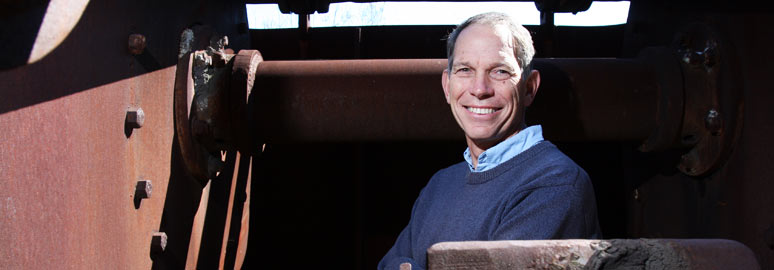Researcher Highlights
In the Pipeline
Professor Rob Melchers
Professor Robert Melchers' research on marine corrosion at the University of Newcastle is leading the way towards safer, more resilient offshore engineering and construction.

Marine corrosion is known to be aggressive, but how aggressive it can be under long-term exposures is the critical question for the safety and economics of much industrial infrastructure, including harbour, coastal and offshore oil industry facilities.
Throughout the world, hundreds of thousands of kilometres of submarine pipelines cross the ocean floor. Every year they are used to transport hundreds of millions of tons of hazardous materials – particularly oil and gas – thus, the integrity of this infrastructure is critical.
Professor Melchers' research contributes to creating a better understanding of the corrosion of steel in marine environments. In particular, it addresses a big issue for the water industry worldwide; the corrosion of mooring chains and wire rope for offshore platforms, and the exterior corrosion of cast iron water pipes. In 2006 the International Ship Structures Committee adopted Melchers' corrosion models for the condition assessment of aged ship structures.
His research throws new light on the influence of bacteria and water pollution in relation to the severity of corrosion. Mathematical models have been developed for general corrosion and offered completely new interpretations of the statistics of maximum pit depth, which is especially important for pipelines, as any leak can be disastrous. These mathematical models also help to predict when corrosion may occur, allowing for efficient planning of resources.
With the world becoming increasingly reliant on concrete sea structures to meet its energy and resources needs, Professor Melchers and his team are also investigating corrosion of reinforced concrete in the marine environment. Reinforced concrete is used in the construction of advanced marine structures such as offshore drilling platforms, superspan bridges and undersea tunnels.
In conjunction with all the leading Water Authorities in Australia, Professor Melchers is developing a model for the loss of concrete on the inside walls of concrete sewer pipes. Used in almost all major cities, these pipes are increasingly at risk. The water industry is very concerned about their remaining life and is keen to hear about innovations to make them less prone to failure. The mathematical models developed so far will help to resolve this issue.
The Australian Research Council recently awarded Professor Melchers $1.1 million in Discovery Project Funding. This includes the award of a prestigious 'DORA' (Discovery Outstanding Researcher Award), one out of only 17 awarded nationally. This funding will further his investigations into the more fundamental aspects of marine corrosion.
Bacterial and microbiological activity is known to contribute to seawater corrosion. However, recent findings have observed very aggressive corrosion also under sterile and apparently benign conditions. No theory to explain these observations currently exists. Melchers has proposed the hypothesis that in certain circumstances second-phase constituents of steels will facilitate autocatalytic corrosion under anoxic conditions. His new research project explores the mechanisms and conditions likely to be involved.
A leading structural engineering academic in Australia, Professor Melchers was the founding editor of the Australian Journal of Structural Engineering. He was also a founding Principal of AMOG Consulting Pty Ltd in 1991, which now has offices in Melbourne, Sydney, Adelaide, Perth and Houston.
Professor Melchers' research into structural reliability and corrosion modelling of steel and concrete structures has won him many international awards and invitations to contribute to international research projects. In 2013 he was awarded the Engineers Australia John Connell Medal, presented annually to a structural engineer who has made a significant national and international contribution to the profession.
Professor Melchers' academic record is outstanding. He has received two five-year Australian Professorial Fellowships from the Australian Research Council, has published four books, over 200 refereed journal papers and numerous conference papers and reports.
Professor Melchers has managed to blend a highly successful academic career while still being a leader in industry and in the profession, through Engineers Australia.
The University of Newcastle acknowledges the traditional custodians of the lands within our footprint areas: Awabakal, Darkinjung, Biripai, Worimi, Wonnarua, and Eora Nations. We also pay respect to the wisdom of our Elders past and present.
